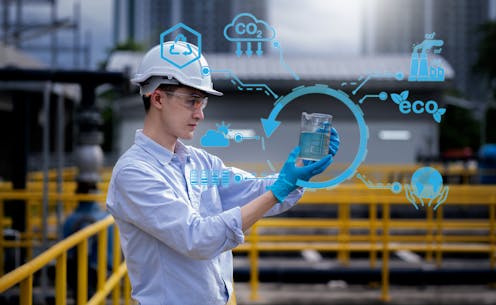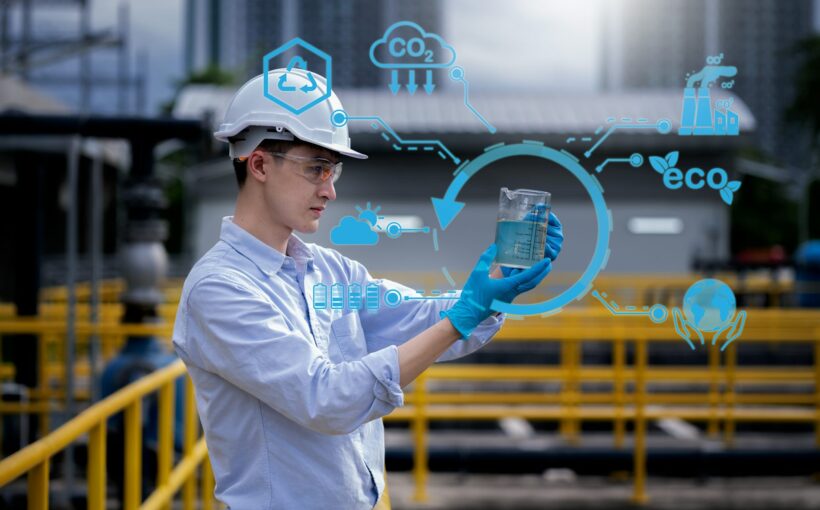
Our water supply is far from infinite.
According to the UN, nearly 1.8 billion people are projected to live in areas with absolute water scarcity by 2025, and two-thirds of the world’s population could be living under water-stressed conditions.
If water becomes scarce or unavailable for an extended period, would you drink recycled sewage water?
In his book Purified: How Recycled Sewage is Transforming our Water, Peter Annin, director of the Burke Center for Freshwater Innovation in Wisconsin, US, explores the socio-political complexities that surround the treatment and reuse of sewage for drinking water. Wastewater recycling is playing an increasingly significant role in addressing the challenges of water scarcity in the US. But, despite its proven technical feasibility, public perception (the “yuck factor”) is hindering wider adoption.
In Singapore, one brewery has used treated wastewater to make craft beer since 2018. This is a prime example of how innovative water management can reshape perceptions and demonstrate the feasibility of recycled water.
There are currently two approaches to recycle wastewater into drinking (or potable) water.
Indirect potable recycling (IPR) adds highly treated wastewater to ground water supplies, rivers or reservoirs. This offers longer-term environmental buffering and mixing of the water. In San Diego, the Pure Water recyling programme aims to provide half of the city’s water by 2035. In Austin, the GoPurple on-site water recycling initiative will save 22 million litres of drinking water a day by 2040.
Direct potable recycling (DPR) adds highly treated wastewater directly to the distribution system. In Windhoek, Namibia, the Gammams wastewater treatment plant has been producing scientifically validated, high-quality drinking water since the early 1960s. But there are fewer examples of this “toilet-to-tap” approach globally.
Public education, outreach programmes and accurate information play a key role in dealing with public perception. In Toowoomba, Australia, for example, residents voted against a reuse project. The lack of transparency from local government, biases in information, and an inherent lack of trust in the project led to strong public opposition.
However, as climate change and population growth places strains on drinking water supplies around the world, new and innovative approaches must be explored to ensure that our taps don’t run dry. In developed countries such as the UK, drinking water is used for multiple purposes including flushing toilets, washing clothes, cleaning cars and watering gardens. According to the UK drinking water inspectorate (DWI), there are currently no proposed direct wastewater recycling schemes in the UK, although several water companies are developing indirect wastewater recycling projects.
As a society, we need to rethink how and where we use this precious resource. Where there are people, there will always be sewage, which will be concentrated in highly populated areas. So, wastewater recycling is becoming a popular choice with water managers as a way to provide local, sustainable and drought-resistant drinking water supplies.
Trust or troubled waters?
Annin’s book provides a compelling and persuasive argument, yet he acknowledges that gaining public trust in this approach requires more than proven technologies: it also needs transparent, fair and innovative education and communication strategies.
Trust is a cornerstone of effective water governance. It plays an essential role in fostering collaboration among different groups of people, such as public authorities, public and private operators, regulators, scientists and users. Building and maintaining trust between citizens and those involved in sustainable water management is crucial.

Yet, citizens may have concerns about trusting the quality of recycled wastewater, particularly when it comes to drinking it. Successful adoption depends on confidence in the organisation responsible for the wastewater’s treatment, management and distribution. For example, the management from a community organisation, rather than a for-profit entity, could potentially generate more trust in the public, as it may be seen as more focused on people’s wellbeing rather than on profit.
While shifting public perceptions about recycled wastewater is possible, a crisis, such as a severe water shortage or environmental disasters, might speed up this process and encourage broader acceptance of recycled water as a needed solution.
Trust is a multi-dimensional concept, yet it is inherently fragile and can be easily eroded by various factors. It is influenced not only by technical competencies but by the transparency of decision-making processes and past experiences.
Negative perceptions, particularly regarding risks, can significantly affect relationships between the public and local authorities. Mistrust in public health stemming from previous experiences – for example, pollution incidents, disease outbreaks and mismanagement – can lead to concerns about the integrity of organisations managing resources.
As a society, we have become disconnected from the resources that sustain us. Food, fuel and water are delivered to our doorstep, while the wastes we produce are efficiently and discreetly removed. This one-way system of using and discarding resources hides the complex flows that make up urban metabolism. We need to rethink this system for a more sustainable future.
To secure a sustainable water future, we must change our behaviours, shift our mindset, embrace innovation, and work together to build the trust necessary for the widespread adoption of recycled wastewater. The time to act is now, before our taps truly run dry.

Don’t have time to read about climate change as much as you’d like?
Get a weekly roundup in your inbox instead. Every Wednesday, The Conversation’s environment editor writes Imagine, a short email that goes a little deeper into just one climate issue. Join the 40,000+ readers who’ve subscribed so far.
![]()
Lynsey Melville has received funding from InterregIVb (EU) to explore the cultivation of algae on wastewater from AD. She has also consulted on projects evaluating advanced wastewater treatment for UK Water Utilities.
Silvia Gullino does not work for, consult, own shares in or receive funding from any company or organisation that would benefit from this article, and has disclosed no relevant affiliations beyond their academic appointment.



